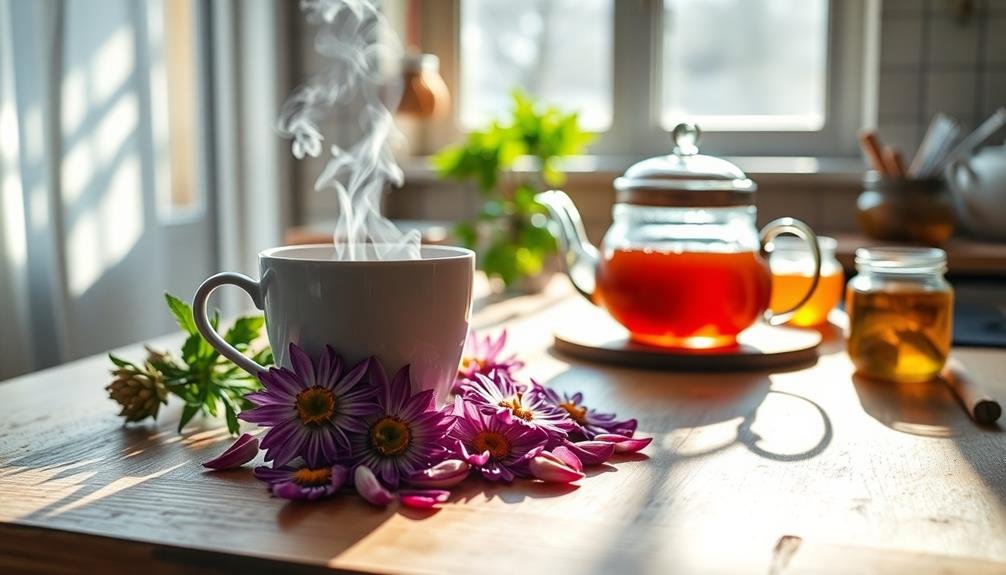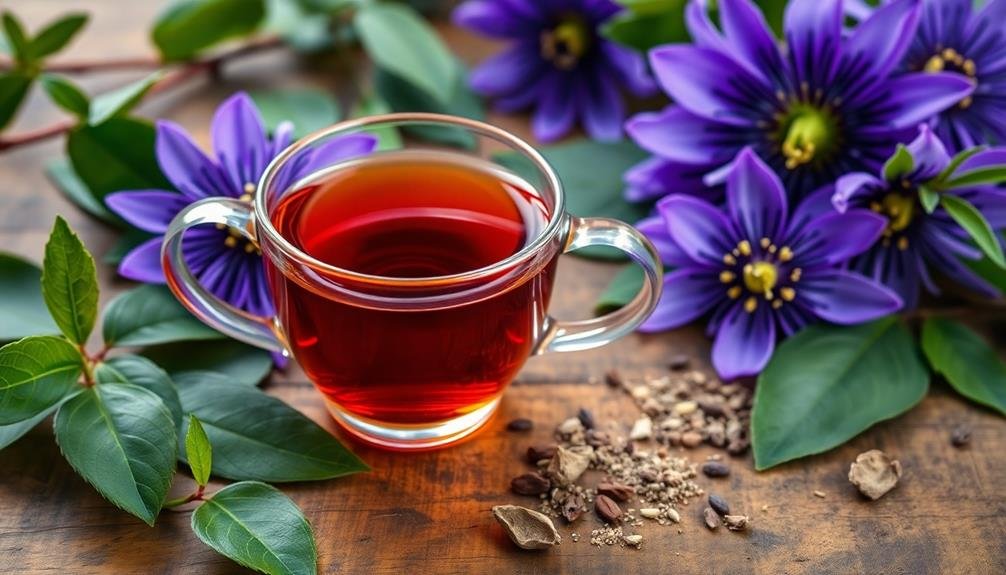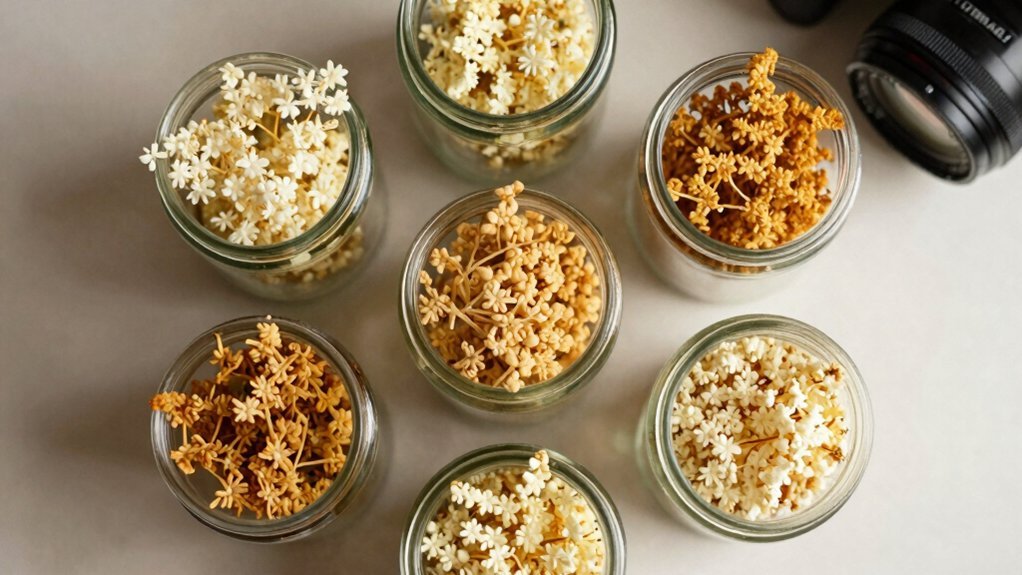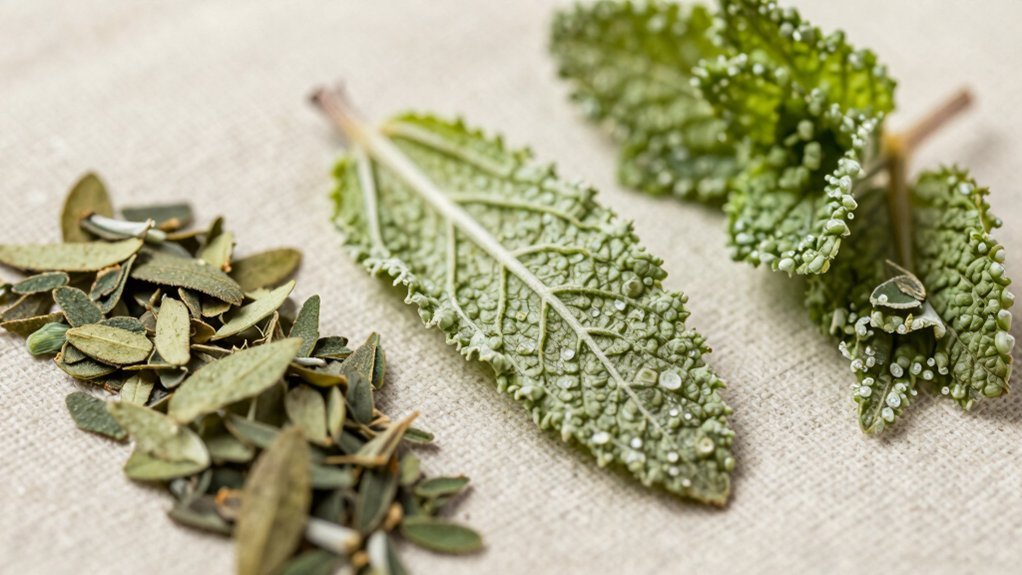A soothing passionflower tea blend typically includes calming ingredients like passionflower, chamomile, lemon balm, lavender, and valerian root. Passionflower is the star ingredient, known for its ability to help reduce stress and promote better sleep. Chamomile adds a gentle sedative effect, while lemon balm lifts your mood. Lavender brings a calming aroma, and valerian root is excellent for restful slumber. To prepare your tea, steep 1-2 teaspoons of these herbs together in hot water for 10-15 minutes. Interested in learning how to customize your blend for even more relaxation benefits?
Benefits of Passionflower

Passionflower is more than just a pretty plant; it offers a range of benefits that can enhance your well-being. When you sip on passionflower tea, you're not just enjoying a delightful flavor; you're also giving your body a boost. This herbal remedy is known for its calming properties, making it a great choice if you're feeling stressed or anxious.
You might find that passionflower helps to improve your sleep quality. By promoting relaxation, it can help ease your mind and prepare your body for a restful night. As you incorporate passionflower tea into your routine, you may notice a reduction in insomnia symptoms, allowing you to wake up refreshed.
Additionally, passionflower has been linked to improved mood and emotional balance. If you're dealing with occasional feelings of sadness or irritability, this herb can provide gentle support. Its natural compounds work to soothe your nervous system, helping you navigate daily challenges with greater ease.
Key Ingredients in the Blend
Now that you know the benefits of passionflower, let's explore the key ingredients that make this tea blend so special.
You'll discover how complementary herbs enhance the soothing effects and learn some tips for brewing the perfect cup.
Understanding these elements will help you fully appreciate your tea experience.
Passionflower Benefits Explained
A cup of passionflower tea offers more than just a delightful taste; it's packed with benefits that can enhance your well-being. One of the most notable advantages is its ability to promote relaxation. If you've ever felt anxious or stressed, sipping on this tea can help calm your mind and body.
Passionflower contains compounds that may increase gamma-aminobutyric acid (GABA) levels in your brain, which can reduce feelings of anxiety.
In addition to its calming effects, passionflower can improve sleep quality. If you struggle with insomnia or restless nights, this herbal remedy might be a perfect nighttime companion. By promoting a restful state, it helps you drift off more easily and enjoy deeper, more restorative sleep.
Moreover, passionflower is known for its anti-inflammatory properties. It can aid in reducing inflammation in the body, potentially alleviating discomfort from conditions like arthritis or muscle soreness.
Lastly, this herb has been linked to digestive health. If you experience occasional stomach issues, passionflower may soothe your gastrointestinal tract, making it a great addition to your wellness routine.
Discover these benefits for yourself with a warm cup of passionflower tea!
Complementary Herbal Ingredients
To enhance the soothing properties of passionflower tea, many blends incorporate complementary herbal ingredients that work synergistically to promote relaxation and overall wellness.
These herbs not only add flavor but also boost the calming effects of your tea. Here are four key ingredients you might find in a soothing blend:
- Chamomile – Known for its gentle sedative effects, chamomile helps reduce anxiety and induces sleep, making it a perfect partner to passionflower.
- Lemon Balm – With its fresh, lemony aroma, lemon balm is famous for easing stress and improving mood, complementing the floral notes of passionflower beautifully.
- Lavender – This aromatic herb is celebrated for its calming scent, which can ease tension and promote tranquility, enhancing the overall soothing experience.
- Valerian Root – Often used for its sleep-promoting properties, valerian root works well alongside passionflower to help you drift off into a restful slumber.
Brewing Techniques Tips
When brewing your soothing passionflower tea blend, it's essential to focus on the key ingredients to maximize their benefits. Start by selecting high-quality dried herbs. Freshness can greatly affect the flavor and potency of your tea.
Here are some brewing tips to enhance your experience:
| Ingredient | Ideal Amount | Brewing Time |
|---|---|---|
| Passionflower | 1-2 tsp | 5-10 minutes |
| Chamomile | 1-2 tsp | 5-7 minutes |
| Lavender | 1 tsp | 5 minutes |
Combine the dried ingredients in a teapot or infuser, and pour boiling water over them. Cover the vessel to trap the steam, which helps release those soothing aromas and flavors. Don't rush the process; steeping longer allows the calming properties to fully infuse into the water.
How to Prepare Passionflower Tea

Preparing passionflower tea is a simple and rewarding process that lets you enjoy its calming effects. With just a few easy steps, you'll have a soothing cup ready in no time.
- Gather your ingredients: Start with dried passionflower leaves, water, and honey or lemon (if you like a little sweetness or tang).
- Boil the water: Bring about two cups of water to a rolling boil. The sound of bubbling water sets the stage for your calming brew.
- Steep the leaves: Once boiling, remove the water from heat and add 1-2 teaspoons of dried passionflower leaves. Cover it and let it steep for 10-15 minutes, allowing the herbal essence to infuse.
- Strain and serve: After steeping, strain the tea into your favorite cup. If desired, add honey or lemon for extra flavor.
Now, sit back and savor your passionflower tea. Feel the warmth radiating through the cup and allow yourself to unwind.
Enjoy this delightful ritual as you embrace the soothing benefits of passionflower, making it a cherished part of your relaxation routine.
Ideal Dosage for Relaxation
Finding the ideal dosage of passionflower for relaxation can enhance your tea-drinking experience. Generally, a dosage of 1 to 2 teaspoons of dried passionflower per cup of water is recommended. If you're using passionflower extract, aim for about 30 to 60 drops, but always check the product label for specific guidance.
When preparing your tea, steep the dried leaves for 10 to 15 minutes to fully extract their calming properties. This allows the active compounds to infuse your brew, promoting relaxation and easing anxiety. You might want to start with a lower dosage to assess your body's response, then gradually increase it if needed.
It's important to listen to your body. Some people may find relief with just one cup, while others might enjoy two or three throughout the day. If you're considering combining passionflower with other herbs, like chamomile or lemon balm, be mindful of the cumulative effects.
Always consult a healthcare professional if you're pregnant, nursing, or taking medications, as they can provide personalized advice tailored to your situation.
Enjoying passionflower tea in the right dosage can make a significant difference in your relaxation journey.
Flavor Profiles of Herbal Blends

When you explore herbal blends, you'll discover a fascinating array of flavor combinations that can elevate your tea experience.
Each blend brings its own unique aromatic notes, creating a symphony of scents and tastes that can soothe or invigorate.
Let's take a closer look at how these flavors interact to enhance your passionflower tea.
Herbal Flavor Combinations
Herbal flavor combinations can create a symphony of tastes that elevate your tea experience. When you blend herbs, the right combinations can transform a simple cup into something extraordinary.
Here are four powerful pairings that you might enjoy:
- Passionflower and Lemongrass: The sweet, floral notes of passionflower harmonize beautifully with the zesty brightness of lemongrass, creating a revitalizing and uplifting blend.
- Chamomile and Lavender: This classic duo brings together the soothing sweetness of chamomile with the aromatic, floral essence of lavender, perfect for winding down after a long day.
- Peppermint and Sage: The cool, invigorating flavor of peppermint combined with the earthy, slightly peppery taste of sage offers a rejuvenating twist that awakens your senses.
- Ginger and Turmeric: The spicy warmth of ginger paired with the earthy, slightly bitter notes of turmeric creates a bold and comforting blend that's perfect for boosting your immune system.
Experimenting with these combinations can lead to delightful discoveries, ensuring that your tea time is never dull!
Aromatic Notes Exploration
Exploring the aromatic notes of herbal blends reveals an enchanting world of flavors that can enhance your tea-drinking experience. Each ingredient contributes its unique essence, creating a symphony of scents and tastes.
When you brew a soothing passionflower tea, you'll notice the delicate, floral notes that invite calmness. Passionflower itself offers a subtle sweetness, balancing well with deeper herbal undertones.
As you sip, you might detect hints of chamomile, which adds a soothing apple-like aroma. This blend often includes lemon balm, bringing a fresh, citrusy zest that uplifts your senses. Together, these herbs create a comforting experience that feels like a warm embrace.
Don't overlook the earthy undertones of valerian root, which ground the blend and add depth. The combination of these aromatic notes invites you to slow down and savor each moment.
Pairing Passionflower With Other Herbs
The beauty of blending passionflower with other herbs lies in the harmony it creates, enhancing both flavor and therapeutic benefits. When you combine passionflower with complementary herbs, you can craft a soothing tea that not only delights your palate but also promotes relaxation and well-being.
Here are four excellent herbs to pair with passionflower:
- Chamomile: Its apple-like fragrance and calming properties make for a perfect companion that eases anxiety and promotes sleep.
- Lemon Balm: This herb adds a revitalizing citrus note and helps lift your mood, while also providing additional stress relief.
- Lavender: Known for its soothing aroma, lavender enhances the calming effects of passionflower, creating a fragrant, tranquil blend.
- Valerian Root: If you're seeking deeper relaxation, valerian's earthy flavor and sedative qualities work wonders alongside passionflower.
Experimenting with these combinations allows you to personalize your tea experience, while maximizing the soothing benefits of each herb.
Brewing Techniques for Optimal Flavor

To truly savor the delightful flavors and benefits of your passionflower tea blend, mastering the right brewing techniques is key. Start by using fresh, high-quality ingredients; this guarantees you capture the full essence of the herbs. Measure about one teaspoon of the dried blend for every cup of water you plan to brew.
Boil fresh, filtered water, then let it cool slightly to around 200°F (just below boiling). Pour the hot water over your passionflower blend and let it steep for about 5 to 10 minutes. If you steep it too long, the tea may become bitter, so keep an eye on the clock.
You can also experiment with the steeping time and temperature to find the flavor profile you prefer. For a stronger taste, increase the amount of herbs or steep for a bit longer.
Once you've reached your desired flavor, strain the tea and enjoy it as is or add a touch of honey or lemon for extra sweetness.
Storage Tips for Herbal Teas
To keep your herbal teas fresh and flavorful, it's essential to store them in ideal conditions.
Make sure to keep them in a cool, dark place, away from moisture and strong odors.
Ideal Storage Conditions
When it comes to storing your soothing passionflower tea blend, keeping it fresh and flavorful requires attention to a few key factors. Follow these simple tips to guarantee your herbal tea stays at its best:
- Choose an airtight container: Opt for glass or metal containers that seal tightly. This prevents air from degrading the delicate flavors.
- Keep it cool and dark: Store your tea in a cool, dark place, like a pantry or cupboard, away from direct sunlight and heat sources. Light and warmth can break down the herbal components.
- Avoid moisture: Make sure your container is dry before adding the tea blend. Moisture can lead to mold and spoilage, ruining your soothing experience.
- Label your stash: Write down the date of purchase or blending on the container. This will help you track freshness and guarantee you enjoy your tea at its peak.
Shelf Life Management
Managing the shelf life of your herbal teas, like the soothing passionflower blend, is crucial for maintaining their potency and flavor. To get the most out of your tea, store it in a cool, dark place, away from heat and moisture. A pantry or cupboard works well, but avoid areas near the stove or sink.
Use airtight containers to protect your tea from oxygen and humidity. Glass jars, metal tins, or even resealable bags can do the trick. Just make sure they're clean and dry before storing your tea. Label your containers with the purchase date, so you can keep track of freshness.
Most herbal teas, including passionflower, can last about 1 to 2 years if stored properly. However, you should always check for color, aroma, and taste. If your tea smells off or has lost its vibrant color, it's time to toss it.
Lastly, avoid compressing the tea leaves in the container, as this can lead to moisture buildup.
Potential Side Effects to Consider

While enjoying the calming effects of passionflower tea, it's important to be aware of potential side effects that may arise.
Though many find it soothing, some individuals might experience adverse reactions. Here are a few side effects to keep in mind:
- Drowsiness – Passionflower can enhance sleepiness, which mightn't be ideal if you have tasks that require your full attention.
- Stomach Upset – Some people report gastrointestinal discomfort, including nausea or diarrhea, particularly with high doses.
- Allergic Reactions – If you're sensitive to plants in the Passifloraceae family, you could face allergic responses, such as rashes or itchiness.
- Drug Interactions – Passionflower may interact with certain medications, especially those affecting the central nervous system, so it's wise to consult your healthcare provider if you're on medication.
Customizing Your Tea Experience
Customizing your passionflower tea experience can elevate its soothing qualities to suit your personal taste and needs. Start by experimenting with brew time; steeping for a shorter duration can yield a milder flavor, while a longer steep enhances the tea's richness.
You can also adjust the tea's strength by varying the amount of dried passionflower you use. Incorporating other herbs can add depth and unique flavors. Consider blending passionflower with chamomile for extra relaxation or mint for a revitalizing twist.
If you prefer a sweeter sip, a touch of honey, agave, or maple syrup can enhance the overall taste without overpowering the soothing properties. Temperature matters too. Enjoy your tea hot for a cozy experience or iced for a rejuvenating drink, especially during warmer months.
Don't shy away from adding a splash of lemon or a hint of ginger to invigorate your brew. Ultimately, customizing your passionflower tea is about finding what resonates with you.
Keep experimenting until you discover the perfect blend that not only calms your mind but delights your palate. Enjoy the process, and let your preferences guide your soothing tea journey.
Frequently Asked Questions
Can I Drink Passionflower Tea Every Day?
You can drink passionflower tea every day, but it's wise to monitor how it affects you. If you experience any side effects or concerns, consult a healthcare professional for guidance tailored to your needs.
Is Passionflower Tea Safe for Children?
Passionflower tea's generally considered safe for children in moderation, but it's best to consult a pediatrician first. Individual reactions can vary, so make certain you monitor for any unusual symptoms or side effects.
Does Passionflower Tea Interact With Medications?
Passionflower tea can interact with certain medications, especially sedatives and blood thinners. It's vital to check with your healthcare provider before consuming it to avoid any potential complications. Always prioritize your safety and well-being.
What Time of Day Is Best to Drink It?
The best time to drink passionflower tea is in the evening. It helps you unwind and promotes relaxation before bed. Just sip it about an hour before you plan to sleep for ideal benefits.
Can I Use Fresh Passionflower for Tea?
Yes, you can use fresh passionflower for tea! Just steep the leaves and flowers in hot water for about 10 minutes. It'll give you a delightful, soothing drink full of flavor and benefits. Enjoy!
In Summary
Incorporating a soothing passionflower tea blend into your routine can be a delightful way to unwind and relax. By understanding its benefits, key ingredients, and preparation techniques, you can create the perfect cup tailored to your taste. Remember to contemplate dosage and potential side effects, and don't hesitate to customize your tea experience. With a little practice, you'll savor not just the flavor, but also the calming effects of this herbal treasure. Enjoy your brewing journey!





Leave a Reply